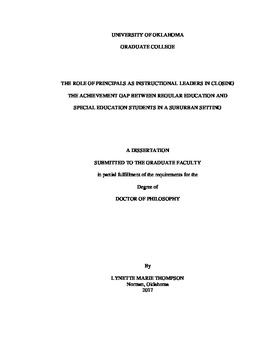| dc.contributor.advisor | Maiden, Jeffrey | |
| dc.contributor.author | Thompson, Lynette | |
| dc.date.accessioned | 2017-05-22T17:46:37Z | |
| dc.date.available | 2017-05-22T17:46:37Z | |
| dc.date.issued | 2017-05 | |
| dc.identifier.uri | https://hdl.handle.net/11244/50899 | |
| dc.description.abstract | Abstract
The purpose of this quantitative study was to determine if there is a relationship between the principal’s knowledge in special education and special education students making adequate yearly progress on the Oklahoma Core Curriculum Test (OCCT)/ End-of-Instruction test (EOI). Closing the achievement gap between regular education students and special education students is imperative. School administrators are becoming more concerned about the performance of their special education students (Gloeckler & Daggett, n.d.), and given the increased accountability that has placed administrators at high stakes and is continuing to be of grave concern. The three research questions asked whether there was a statistically significant relationship between principals’ years of experience, certification and their overall knowledge in special education in and the gap between regular education and special education students test scores. Conceptually, this study was framed around transactional and transformational leadership theories. Data were collected through the utilization of a descriptive survey. Demographic information, years of experience, certification and overall knowledge of special education were collected from principals to provide detailed information for the basis of analysis. The participants included 51 principals from five suburban 6A school districts located in Oklahoma. Data were analyzed using SPSS 24.0 for Windows. The results of this study were insightful despite the study revealing there was no statistically significant relationship between the data collected on principals and the gap between student test scores in the regular education and special education subgroups. This study contributes to education by providing recommendations to District Administrator and Site Administrators on how they can assist in increasing student achievement in the subgroup area of special education. Principals becoming instructional leaders and focusing on achievement of all students will make a remarkable difference in the academic achievement of students with special needs. | en_US |
| dc.language | en_US | en_US |
| dc.subject | Education, Special. | en_US |
| dc.subject | Education, Curriculum and Instruction. | en_US |
| dc.subject | Education, Administration. | en_US |
| dc.subject | Instructional Leadership | en_US |
| dc.title | THE ROLE OF PRINCIPALS AS INSTRUCTIONAL LEADERS IN CLOSING THE ACHIEVEMENT GAP BETWEEN REGULAR EDUCATION AND SPECIAL EDUCATION STUDENTS IN A SUBURBAN SETTING | en_US |
| dc.contributor.committeeMember | Brandes, Joyce | |
| dc.contributor.committeeMember | Garn, Gregg | |
| dc.contributor.committeeMember | Jones, John | |
| dc.contributor.committeeMember | Williams, Leslie | |
| dc.date.manuscript | 2017-05 | |
| dc.thesis.degree | Ph.D. | en_US |
| ou.group | Jeannine Rainbolt College of Education::Department of Educational Leadership and Policy Studies | en_US |
